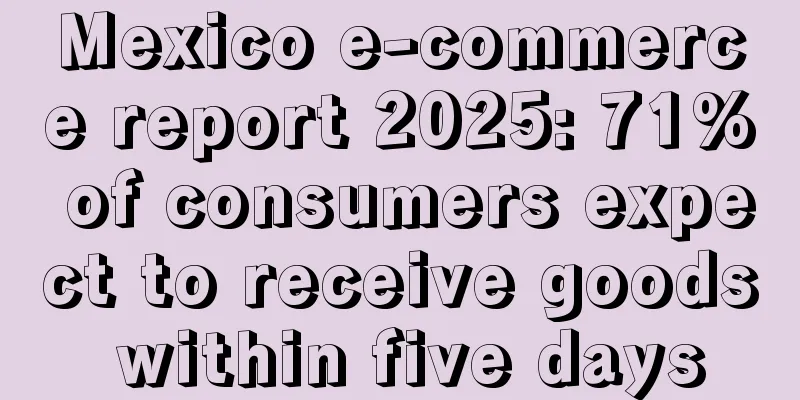Mexico e-commerce report 2025: 71% of consumers expect to receive goods within five days

|
It is learned that recently, according to the "Mexico E-commerce Report 2025" released by Elogia, the Mexican e-commerce market continues to expand, and consumers' online shopping frequency and spending continue to increase. The report shows that 45% of Mexican consumers shop online every week, with an average purchase of 1,203 Mexican pesos. Mercado Libre (77%) and Amazon (73%) are the preferred platforms for consumers, dominating in categories such as fashion, electronics and beauty products. Among the factors that influence consumers' purchasing decisions, price and promotion (77%), platform quality and trust (74%), and shopping convenience (73%) are the most critical factors. At the same time, consumers' expectations for fast delivery are increasing, with 71% of consumers saying they hope to receive their purchased goods within five days. This trend shows that e-commerce platforms need to continuously optimize delivery speed to meet consumer needs. Despite the strong performance of the Mexican e-commerce market, after-sales service still faces challenges. About 30% of consumers said they encountered difficulties in the return process, and 74% of Mexican consumers said they would choose to abandon a brand if they encountered unsatisfactory customer service. Therefore, improving the quality of after-sales service and optimizing customer support will become an important issue for e-commerce platforms. In terms of device usage, smartphones have become the preferred device for online shopping for Mexican consumers. 92% of consumers prefer to shop through mobile apps rather than traditional e-commerce websites. This trend requires e-commerce platforms to strengthen the optimization of mobile user experience to ensure that consumers can shop smoothly on their phones. In addition, the Mexican e-commerce market is actively adopting new technologies such as live shopping and artificial intelligence. The report mentioned that 58% of sellers plan to use live shopping tools (such as TikTok Shop and Instagram Shopping) in the future, while 53% of sellers intend to adopt artificial intelligence-based technologies (such as ChatGPT) to enhance the personalization and automation of the shopping experience. The application of these technologies will help e-commerce platforms stand out from the competition. The report also highlights the "omnichannel" trend in the e-commerce industry. 79% of consumers said they would combine online and offline shopping channels to make purchases, showing consumers' demand for multiple shopping channels. Therefore, e-commerce platforms need to strategically integrate online and offline resources to provide a seamless shopping experience. Author✎ Summer/ |
<<: Clothing is the most returned category by American consumers, with size issues ranking first
>>: 13,000 dryers sold on Amazon and other platforms have been recalled! There is a fire hazard
Recommend
E-commerce tools: 9 must-have plugins for Amazon FBA sellers in 2019
Most Amazon FBA sellers know the importance of us...
This generation of consumers will buy even if the price goes up! US retail sales surged by $10.7 billion in October
It is learned that according to foreign media repo...
What is E-Trade? E-Trade Review
The predecessor of RETS International Logistics Co...
American household goods enter the stock market! You must know these consumption trends
Recently, DigitalCommerce360 and BizrateInsights c...
How to improve the quality of copy, pictures and videos on Amazon product pages
In e-commerce sales, physical products are displa...
Amazon admits to behind-the-scenes manipulation! Brother-in-law appears in court to explain
Let’s start today’s main text. ◆ ◆ ◆ ◆ On Tuesday...
Breaking news! Another large number of Amazon sellers’ information has been leaked
According to foreign media reports, Amazon recentl...
What is Meicang Internet? Meicang Internet Review
Twusa (www.twusa.cn) is a modern supply chain mana...
What is BidorBuy? BidorBuy Review
BidorBuy is an important online shopping mall in S...
Do you have to show your work to your boss? How to complete a solid market research report within 24 hours? I hope you can give me some suggestions.
Anonymous user My C position The recent work exper...
What is Haofang Group? Haofang Group Review
Founded in 2006, Hofan Group is committed to the s...
A guide to getting reviews for new product listings on Amazon in 2019: How to successfully get the first review
On Amazon, it is difficult to get reviews for som...
Amazon algorithm change or bug? A large number of sellers are charged extra commissions!
Recently, Typhoon "Compa" swept across s...
What is Tiki? Tiki Review
Founded in March 2010, Tiki is a rapidly growing B...
5 Essential Tools for Selling Products
Quickly promote the 19th article outside the site ...









